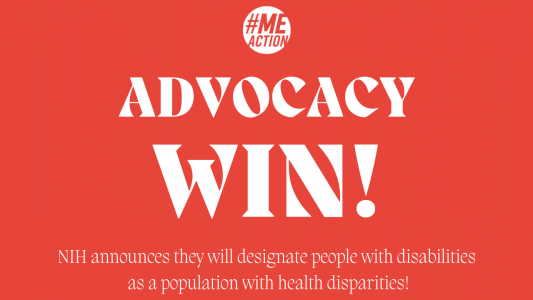The National Institutes of Health (NIH) announced they will designate people with disabilities as a population with health disparities. This is a win that could have a large impact on people with ME and the millions of people with disabilities across the country.
“This designation recognizes the importance and need for research advances to improve our understanding of the complexities leading to disparate health outcomes and multilevel interventions,” said Dr. Pérez-Stable. “Toward this effort,National Institutes on Minority Health and Health Disparities and other NIH institutes launched a new research program to better understand the health disparities faced by people with disabilities who are also part of other populations designated as having health disparities.”
We fought for this because the National Institutes on Minority Health and Health Disparities previously rejected the recommendation to recognize people with disabilities as a “health disparity population” within the NIH.
The letter, co-authored by Dr. Bonnielin Swenor, Director of The Johns Hopkins Disability Health Research Center, and Dr. Jae Kennedy, Professor of Community and Behavioral Health, WSU College of Medicine, explained the value of this proposal:
“Designating people with disabilities as an NIH health disparity population is more than a semantic exercise – centers, offices, and institutes across the NIH use these categories to develop research concepts and FOAs, particularly in the domain of health disparities research. They are also used to target training support and development funds for NIH employees and extramural grantees. Including people with disabilities is therefore essential to the broader health equity goals of the NIH and the US Department of Health and Human Services.”
Many grants at NIH focus on “health disparities populations”. More than one disability researcher has met with a program officer at NIH to see if their research idea was eligible for a specific grant, only to be turned away because their research was on disability– until now.
HHS Secretary Xavier Becerra stated, “Research to understand the barriers and unmet needs faced by people with disabilities, and to develop effective interventions to address them, is needed. This designation will help to improve access to healthcare and health outcomes for all people.” For us, that means that the NIH will be faced with examining the barriers people with ME have faced for decades.
#MEAction signed on to support this effort brought forth by disability rights groups. This type of win is why aligning with our broader disability community has a positive impact for all.
Thank you for all of you who continue to support #MEAction, disability advocacy, and our broader chronic illness community. This gives us more power to fight for people with ME each and every day.





